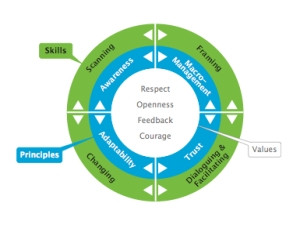A given in our world and our work today is increasing complexity. We need to solve more complex problems in less time than ever before.
In the software development domain, a group of leading practitioners observed in 2001: "The best architectures, requirements, and designs emerge from self-organising teams." (www.agilemanifesto.org) This started a revolution in the IT world called "Agile".
More than a decade later, we are confident that this holds true for a wide variety of work. But we have more-or-less failed to help managers at every level in our organisations know how to cope with these changes. Questions like: "What do we need in order to support this self-organisation?" and "Could there be any way of helping this special kind of teamwork to emerge?" remain unanswered for the majority of people who are accountable for the work of others.
In studies we have conducted with a number of North American and European organisations, we have observed that investment in developing leadership skills is essential to creating lasting benefit from Agile methods.
As with communication, the ability to lead is not a given. In order to support self-organising teams effectively, special training is helpful. Combining the essential soft skills of professional facilitation with agile know-how, you develop a very different mindset to the one conventionally assumed when attempting to "manage" a team.
Leading self-organising teams

As our response to this leadership development challenge, we have created a pragmatic two-day 'Leading Self-Organising Teams' training masterclass for technical managers and professionals, which helps them to develop modern leadership skills, including scanning, framing, dialoguing and facilitating, and changing.
The course will enable you to:
* Understand the principles of Agile leadership
* Learn and apply state-of-the-art leadership tools
* Enrich your skill set through practical roleplays
* Cope with tricky situations and identify blind spots
Feedback from previous participants
"Energising and refreshing ideas and techniques which can practically implement and aid in leading self-organised teams. Highly recommend." MH, Team Lead and CSM, Derivco
"Great feedback and personal insights. Helped me become a better me." MvH, Scrum Master, Allan Gray
"Learning from others when experiences were shared was key for me. Agile leaders never stop learning." PS, IT Services Delivery Manager, Mix Telematics Africa
"Delighted I was part of this experience. Practical learning. Loved the format. Well done, Peter & Sigi." GS, Business Analyst, Alacrity
"Agile will change your role as a manager. Embrace this change early enough with the right tools: the LST masterclass is your hardware store!" RH, BPM & Workflow Manager, Silica
Course leaders
Dr Sigi Kaltenecker is an organisational consultant with extensive experience in change management and leadership coaching. He is co-owner and managing partner of Loop Consultancy. He is co-editor of the Platform for Agile Management and co-author of the book: "Kanban in IT: Creating a culture of continuous improvement".
Peter Hundermark has worked with iterative and incremental software development processes for more than a decade. He is a Certified Scrum Coach and Trainer and a member of the Stoos Network. He is the author of "Do Better Scrum". His passion is helping leaders in organisations achieve lasting change.
Course details
Leading Self-Organising Teams
Cape Town * 15-16 April 2013
Johannesburg * 18-19 November 2013
Share
Scrum Sense
Established in 2007, Scrum Sense is a leading Agile consulting, training and coaching organisation, with offices in Johannesburg and Cape Town. During this time, Scrum Sense consultants have trained 2 000 people and helped 100 teams adopt Agile methods in a wide range of financial services, media and ICT organisations.
Editorial contacts